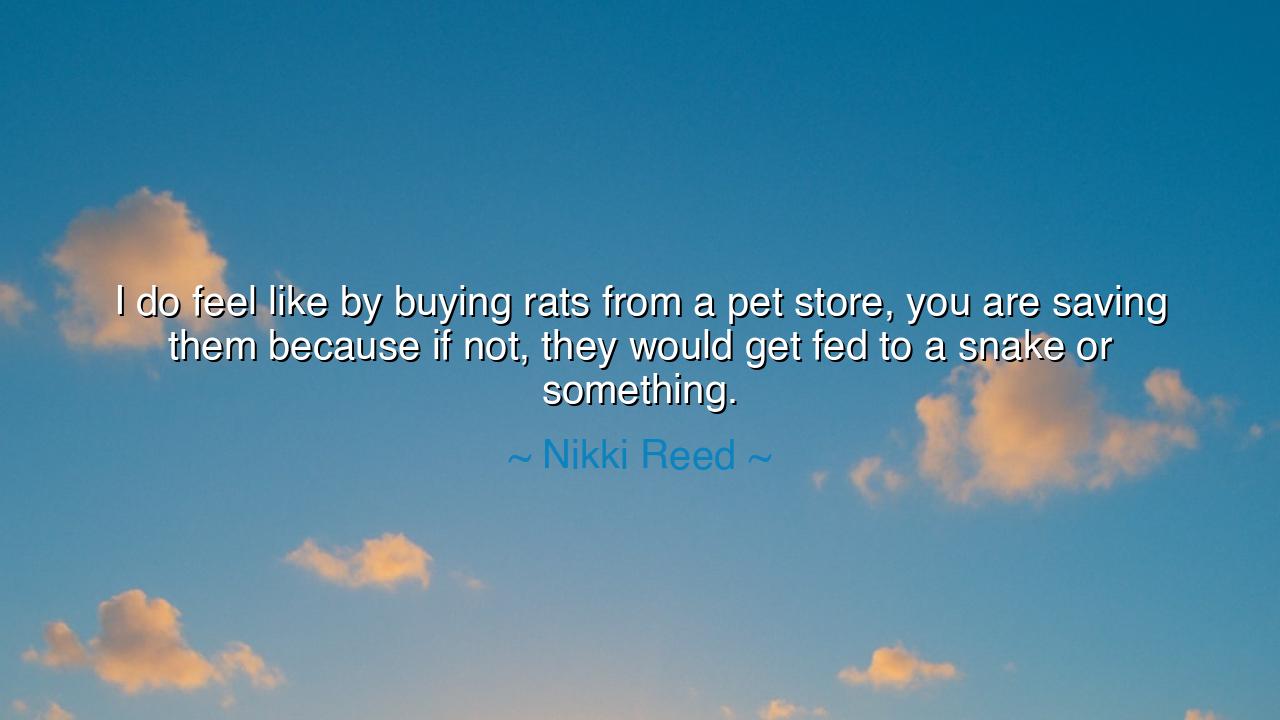
I do feel like by buying rats from a pet store, you are saving
I do feel like by buying rats from a pet store, you are saving them because if not, they would get fed to a snake or something.






Nikki Reed once confessed with tender honesty: “I do feel like by buying rats from a pet store, you are saving them because if not, they would get fed to a snake or something.” What seems at first like a small and passing thought about animals is, in truth, a deep reflection on mercy, on the value of life, and on the choices that humans must make when confronted with the fragile fates of creatures that depend on them. Within this simple statement lies an ancient moral dilemma: how much power do we wield over life, and how do we choose to use it?
The rat, despised by many, seen often as vermin, becomes in Reed’s words a being worthy of compassion. For in the cages of the pet store, its fate is uncertain: to be bought as a companion, loved and cared for, or to be purchased as mere prey for another creature’s hunger. Here we see the crossroads of mercy and indifference. Reed’s belief is that even a small act, even the buying of a humble creature, can be a salvation—a rescue from a fate it never chose.
The ancients, too, wrestled with such questions. In the temples of Egypt, cats were revered and mummified, while other creatures were slaughtered as sacrifices. In India, the cow was exalted, yet goats were slain at the altar. The lesson resounds: human beings have always decided which animals live and which perish, often guided by convenience or tradition. Reed’s words break through that tradition, suggesting that even the smallest life—the rat—deserves the chance to be cherished, not discarded.
History offers moving examples of compassion toward the overlooked. Saint Francis of Assisi, centuries ago, preached to the birds and tamed the wolf of Gubbio, teaching that all creatures, great and small, share in the breath of creation. In more recent times, those who rescued stray dogs from the battlefields of war found hope and companionship in the very beings others dismissed as expendable. Each story reveals the same truth Reed touches: to save even the lowliest life is to affirm that life itself has worth.
Yet Reed’s reflection also uncovers a paradox. For by rescuing one rat, another may yet be consumed by the snake. The cycle of predator and prey cannot be abolished. But what she reveals is that in the human heart lies a unique power: the power to choose compassion even when nature dictates indifference. We cannot save all, but to save one is still an act of meaning. The choice to see value where others see none is the beginning of wisdom.
The lesson is therefore luminous: never underestimate the significance of small mercies. To you, it may seem trivial to save a rat, but to that creature, it is the difference between life and death. So too in human affairs—small acts of kindness, gestures toward those forgotten or despised, ripple outward in ways unseen. To choose compassion in the face of indifference is to light a flame in a darkened world.
Practical action flows from this wisdom. If you encounter the overlooked, whether animal or human, ask not whether they are mighty or beautiful, but whether they are in need. Extend your hand. Adopt, rescue, protect, or simply care. Understand that the measure of a soul is not in how it treats the powerful, but how it treats the powerless. For in such choices lies the difference between cruelty and compassion, between shadow and light.
Thus Nikki Reed’s words, though spoken of rats in a pet store, rise into timeless teaching: Every life has worth, and every act of mercy matters. To save one is not to change the whole world, but it is to change that creature’s world entirely. And perhaps that is enough—that in a universe vast and cold, one act of compassion becomes a beacon, reminding us that to choose kindness is to choose the path of humanity itself.






AAdministratorAdministrator
Welcome, honored guests. Please leave a comment, we will respond soon